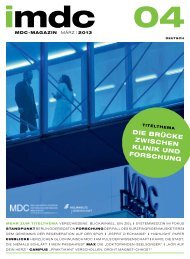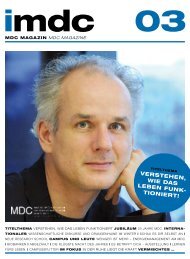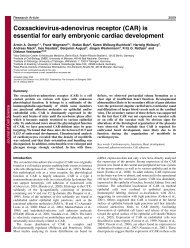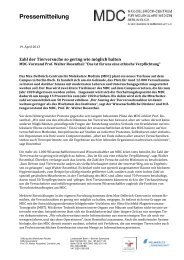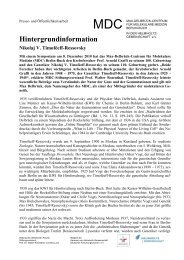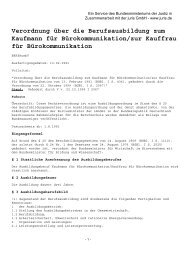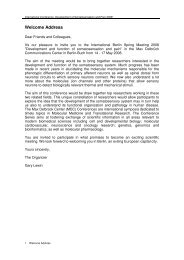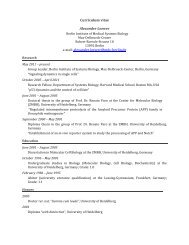of the Max - MDC
of the Max - MDC
of the Max - MDC
Create successful ePaper yourself
Turn your PDF publications into a flip-book with our unique Google optimized e-Paper software.
Molecular Immuno<strong>the</strong>rapy<br />
Antonio Pezzutto<br />
T<br />
he goal <strong>of</strong> our work is <strong>the</strong> implementation <strong>of</strong> basic research into preclinical models and clinical trials. A first<br />
strategy is based on <strong>the</strong> induction <strong>of</strong> cancer immune responses by vaccination. A pilot clinical study with a genemodified<br />
tumor cell vaccine for treatment <strong>of</strong> advanced renal cancer has been concluded, a follow-up study with<br />
simultaneous administration <strong>of</strong> an antibody against regulatory T-cells is in preparation. A phase I Dendritic cell<br />
vaccination study in chronic myeloid leukemia has also been successfully concluded, leading to a multicenter clinical<br />
trial in patients with persisting minimal residual disease after imatinib treatment, due to start in 2008. These<br />
clinical studies are flanked by preclinical animal models <strong>of</strong> DNA vaccination whereby vectors coding for cytokines or<br />
<strong>the</strong> chemokines CCL19 and CCL21 lead to an improved stimulation <strong>of</strong> antigen presenting cells / T-cells. With <strong>the</strong> aim<br />
<strong>of</strong> improving immunity against <strong>the</strong> adenocarcinoma-associated EpCAM antigen we have generated mutated, heteroclitic<br />
peptides <strong>of</strong> EpCAM that display a high immunogenicty. These peptides are being evaluated for clinical use. A<br />
fur<strong>the</strong>r strategy is T-cell receptor gene transfer for adoptive <strong>the</strong>rapy <strong>of</strong> Lymphomas. Transgenic T-cells that use <strong>the</strong><br />
T-cell receptors <strong>of</strong> EBV-specific CD8 and CD4 T-cell clones are being developed for adoptive immuno<strong>the</strong>rapy <strong>of</strong> EBV<br />
associated diseases such as Hodgkin’s Disease and Post-Transplant Lymphoproliferative Disorders (PTLDs). Epitopes<br />
<strong>of</strong> <strong>the</strong> B-cell antigens CD19 and CD20 are also being evaluated as targets for TCR transgenic T-cells.<br />
Clinical vaccination studies using dendritic cells<br />
or tumor cells for <strong>the</strong> induction <strong>of</strong> tumor specific<br />
immune responses<br />
Jörg Westermann and J. Kopp, in cooperation with T.<br />
Blankenstein and W. Uckert.<br />
Having shown that T-cells from chronic myeloid leukemia<br />
(CML) patients specifically recognize <strong>the</strong> bcr-abl fusion peptide<br />
characteristic <strong>of</strong> <strong>the</strong> disease, we have performed a clinical<br />
vaccination study using in vitro-generated, bcr-abl positive<br />
dendritic cells (DC). A reduction in <strong>the</strong> tumor load has<br />
been seen in 50% <strong>of</strong> <strong>the</strong> patients, a follow-up multicenter<br />
national trial is due to start in 2008 in patients who did not<br />
achieved complete remission upon treatment with <strong>the</strong> tyrosine-kinase<br />
inhibitor imatinib. In renal carcinoma, a genemodified<br />
tumor cell vaccine that expresses co-stimulatory<br />
molecules and secretes Interleukin-7 has been generated in<br />
cooperation with Th. Blankenstein and W. Uckert. After successful<br />
conclusion <strong>of</strong> a pilot study, a follow-up trial in conjunction<br />
with antibodies that increase T-cell stimulation by<br />
reducing regulatory T-cells is being planned. GMP quality DC<br />
and gene-modified tumor cells are generated in <strong>the</strong> GMP<br />
laboratory <strong>of</strong> <strong>the</strong> Robert Rössle Cancer Clinic.<br />
DNA Vaccination: preclinical models<br />
Jörg Westermann, Tam Nguyeng Hoay in cooperation with<br />
U. Höpken and M. Lipp<br />
DNA vaccination <strong>of</strong>fers several advantages over <strong>the</strong> use <strong>of</strong><br />
peptides as vaccines (DNA covers several MHC-I and MHC-II<br />
epitopes, directly targets <strong>the</strong> endogenous presentation<br />
pathway and contains immunostimulatory CpG sequences).<br />
In cooperation with <strong>the</strong> group <strong>of</strong> M. Lipp (Molecular Tumor<br />
Genetics) we have explored <strong>the</strong> possibility <strong>of</strong> recruiting<br />
immune cells at <strong>the</strong> vaccine site by inserting DNA sequences<br />
coding for <strong>the</strong> chemokines CCL19 and CCL21 as possible<br />
adjuvants. Using beta-galactosidase as a surrogate tumor<br />
antigen we have found that coexpression <strong>of</strong> CCL19 with<br />
beta-gal resulted in enhancement <strong>of</strong> a Th1-polarized<br />
immune response with substantial improvement <strong>of</strong> <strong>the</strong> protective<br />
effect <strong>of</strong> <strong>the</strong> vaccine. Immunohistochemistry<br />
revealed an increased CD8+ T-cell infiltration in <strong>the</strong> tumor<br />
tissue. These encouraging results have been extended to a<br />
preclinical model using <strong>the</strong> human breast-cancer associated<br />
antigen Her-2 as a target antigen, with <strong>the</strong> aim <strong>of</strong> developing<br />
a vaccine for breast cancer patients.<br />
Immunity against EpCam (Epi<strong>the</strong>lial Cell<br />
adhesion molecule)<br />
Oliver Schmetzer in cooperation with P. Schlag<br />
The Epi<strong>the</strong>lial Adhesion Molecule, EpCam, is overexpressed<br />
in human adenocarcinomas. Some patients with colorectal<br />
cancer have circulating CD4 positive T-cells that recognize<br />
MHC-II binding EpCam peptides. Heteroclitic peptides with<br />
minor aminoacid substitutions appear able to induce a much<br />
stronger T-cell stimulation by upregulating <strong>the</strong> TCR. A splice<br />
variant <strong>of</strong> CD3 delta coding for a 45-mer polypeptide<br />
appears to mediate <strong>the</strong> increase <strong>of</strong> <strong>the</strong> T-cell receptor densi-<br />
Cancer Research 133



